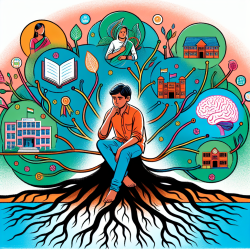Empowering Change: Utilizing Research to Combat Sexual Violence in Haiti
As practitioners dedicated to improving the lives of children, it's crucial to stay informed about the latest research and how it can be applied to our work. A recent study titled "Lifetime and Child Sexual Violence, Risk Factors and Mental Health Correlates Among a Nationally Representative Sample of Adolescents and Young Adults in Haiti: A Public Health Emergency" provides valuable insights that can guide us in addressing sexual violence, a pressing issue affecting many young lives.
Understanding the Research
The study conducted a national survey in Haiti, revealing alarming rates of sexual violence among adolescents and young adults. With a lifetime sexual violence prevalence of 27.44%, and child sexual violence at 11.27%, the findings highlight a public health emergency. The research identifies significant risk factors, including family physical violence, emotional abuse, and parental divorce, which are strongly associated with higher odds of sexual victimization.
Implications for Practitioners
As practitioners, understanding these risk factors is essential for developing effective prevention and intervention strategies. Here are some actionable steps we can take:
- Integrate Trauma-Informed Care: Incorporate trauma-informed practices into therapy sessions to create a safe and supportive environment for victims of sexual violence.
- Enhance Screening and Assessment: Utilize comprehensive screening tools to identify children at risk of sexual violence and related mental health issues, such as PTSD and depression.
- Collaborate with Community Resources: Partner with local organizations and schools to provide holistic support, including mental health services and educational programs for parents and caregivers.
- Advocate for Policy Changes: Use the research findings to advocate for policies that protect children and support victims of sexual violence, ensuring they receive the necessary care and resources.
Encouraging Further Research
This study serves as a call to action for further research and data collection. By understanding the prevalence and impact of sexual violence, we can better tailor our interventions to meet the needs of affected individuals. Practitioners are encouraged to engage in research initiatives and collaborate with academic institutions to expand the knowledge base on this critical issue.
To read the original research paper, please follow this link: Lifetime and Child Sexual Violence, Risk Factors and Mental Health Correlates Among a Nationally Representative Sample of Adolescents and Young Adults in Haiti: A Public Health Emergency.










